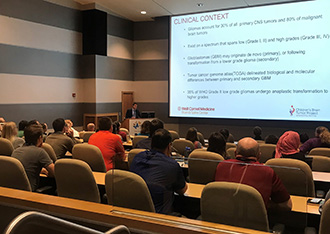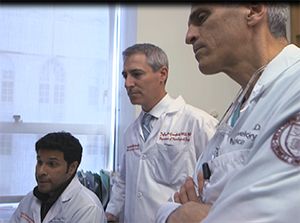
Dr. Prajwal Rajappa knows a lot about brain tumors, especially the rare kinds that tend to strike children. As a physician and scientist passionate about brain tumors, he has worked at the Weill Cornell Medicine Children’s Brain Tumor Project (CBTP) for seven years, observing tumors through microscopes, growing them in petri dishes and in animal models, and – most recently – working to understand their genomic fingerprints.
Dr. Rajappa has been the Precision Medicine Fellow at the CBTP since 2016, under the mentorship of Dr. Jeffrey Greenfield, Co-Director with Dr. Mark Souweidane of the CBTP. Dr. Rajappa coordinates Dr. Greenfield’s innovative program, in which every pediatric brain tumor patient operated on is offered genomic sequencing and a targeted medicine consultation as part of their standard of care. When a tumor is biopsied or removed, samples of the tumor are taken directly from the operating room to the pathology lab for examination, to the CBTP laboratory to grow in dishes and animal models, and to the Englander Institute for Precision Medicine for sequencing and drug screening. This complicated process generates a wealth of data about the tumor, the goal of which is to direct targeted treatment efforts.
Dr. Rajappa is excited to be part of an initiative that could be a game-changer in personalized brain tumor treatment for children. He recently presented the CBTP’s Precision Medicine Initiative at a Grand Rounds talk at Nationwide Children’s Hospital in Columbus, Ohio – he was invited to present by Elaine R. Mardis, PhD, Nationwide’s Chair of Genomic Medicine as well as President-elect of the American Association for Cancer Research. Dr. Rajappa also spoke and received the Tumor section’s Pediatric Brain Tumor Award for best paper, on Dr. Greenfield’s behalf, at the CNS annual meeting in Houston last month.
“Precision medicine is the future of cancer care,” says Dr. Rajappa. “I was honored to be invited to present our precision medicine program at Nationwide, because I believe we are setting the new standard of care here and it is gratifying that we are being noticed for setting a national standard for excellence. We offer every family whose child has brain tumor surgery here an individual consultation so we can develop a personalized sequencing algorithm based on their specific disease. Once the sequencing is performed, I present these findings to a multi-disciplinary tumor board. Working closely with the surgeons, oncologists, and the computational arm of the Englander Institute for Precision Medicine, the data we analyze from each case is sifted through to find clinically usable data and hopefully inform actual decisions on how to best treat each child’s tumor.”
 Dr. Rajappa with Dr. Greenfield and Dr. Souweidane
Dr. Rajappa with Dr. Greenfield and Dr. SouweidaneDr. Rajappa notes that some of the lab’s most exciting discoveries occur when the genetic data reveal that the tumor is not even the type it had appeared to be under a microscope. “This more accurate molecular diagnosis allows the treating team to re-define and personalize their treatment and allows us to predict prognosis more precisely which is so important for families,” he says. “In the best-case scenarios, sequencing identifies a mutation that can be targeted with a treatment known to be effective against that specific alteration. That’s the bottom line for the entire precision medicine effort: finding a specific treatment that is effective against an individual tumor.”
Dr. Rajappa estimates that through the CBTP’s algorithm and tailored treatment plan, as many as 75 percent of genetic mutations found on sequencing are virtually diagnostic, prognostic, or targetable – and he says he likes those odds.
“We need to improve the standard of care for high grade, inoperable, and recurrent tumors,” Dr. Rajappa emphasizes. That’s the promise of precision medicine – improving clinical care based on personalized genomic data that will hopefully help kids defeat brain tumors.”